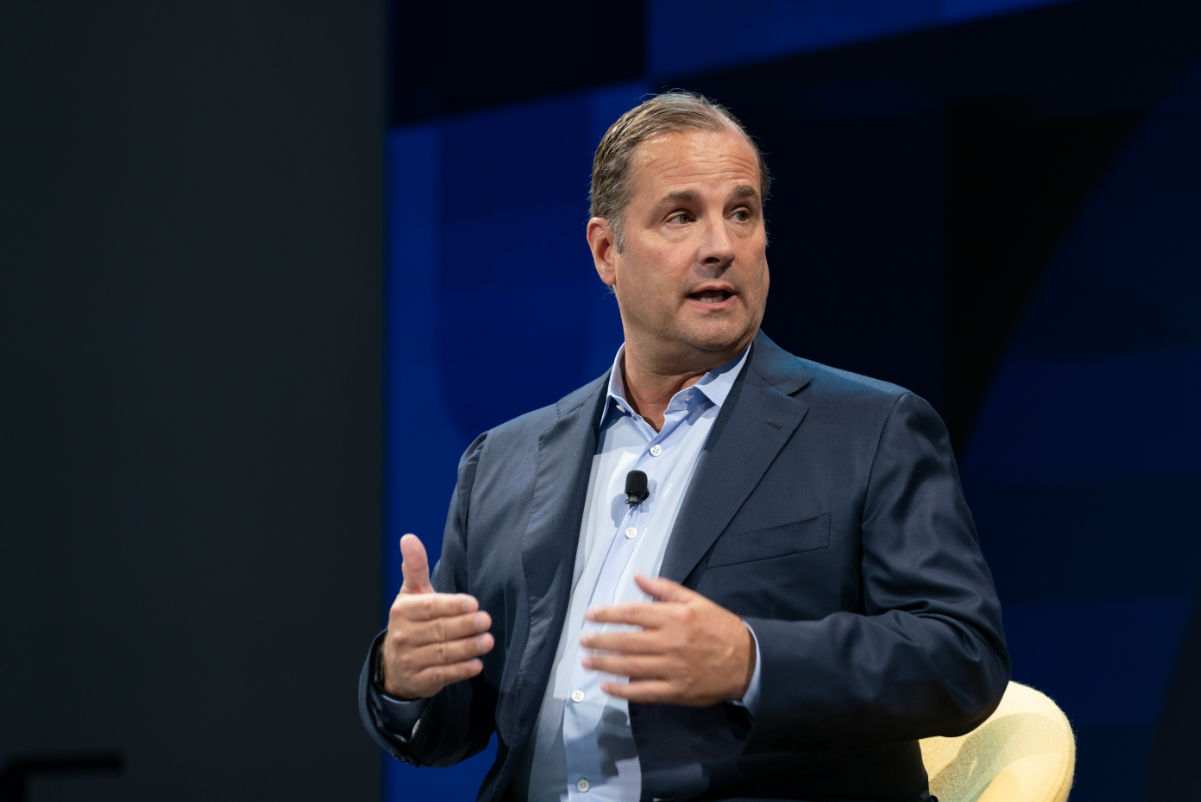Marriott’s 3 Big Challenges: CEO Anthony Capuano Makes a Case for Growth

Skift Take
Marriott CEO and president Anthony Capuano faces a pivotal point in the growth trajectory at the world's largest hotel group.
He is focusing on filling out the map worldwide with various types of properties so that Marriott always has a property to offer its most loyal guests for every type of trip. The CEO is betting specifically on the luxury hotel category because he believes it will generate fat fees that could compensate for the company's expansion into lower-margin mid-tier brands.
Marriott has also launched a multi-year technology revamp that should help its staff become more efficient and encourage more guests to buy more services.
"I can't see the end of the runway for growth," Capuano told Skift Monday during an interview at the Americas Lodging Investment Summit (ALIS) in Los Angeles.
Still, the challenges are real – here's how Capuano said he's handling them.
Will Future Development Hit Profit Margins?
The challenge: Marriott has more than doubled its room count over a decade. It's gone from managing 675,000 rooms at the end of 2013 to 1.59 million at the end of last year. Can it keep up the pace?
Some skeptics say Marriott has put hotels in all the key cities it can by now — grasping the low-hanging fruit of prime locations. Future development may be in third-tier markets generating third-tier margins.
Capuano's optimism: "Some have asked us, 'Aren't you running out of street corners here at home?' The answer is a resounding no."
Marriott said on Monday it added 91,000 rooms in the U.S. and Canada last year. Roughly a third of that came through a licensing deal with MGM Resorts.
Marriott had a 16% share of open hotel rooms in the U.S. and Canada as of September 30.
Outside the U.S. and Canada, Marriott added 73,000 rooms last year. It only has 4% market share outside of North America.
Capuano's re-tooling: The CEO has ensured the company has enough development staff dedicated to the markets with the most opportunity to scale quickly.
Exhibits A and B are China and the Middle East. Many owners in these markets are accustomed to hiring third parties to manage properties on their behalf and opportunities for scale because of uniform languages, laws, and methods of doing business.
"You've got some markets where you have this wonderful combination of long runways for growth and a much higher intensity owner desire than in the U.S. for management contracts," Capuano said.
So Capuano is concentrating forces in these markets. He's also emphasizing Europe, which remains in high demand from travelers and where management contracts are also common.
Will Mid-Tier Brands Put Pressure on Fees?
The challenge: One of Marriott's most lucrative business lines is charging owners fees for managing hotels on their behalf. Yet as Marriott adds mid-tier brands, its average rates will drop — and the management fees it generates will drop in absolute dollars.
Investors tend to give a premium valuation to hotel companies that generate the highest average revenue per available room. Four Seasons was bought out in a deal at an estimated 40 times earnings, while Wyndham, which charges much lower average room rates, fetched around 12 times earnings when Choice offered to buy it last year.
The hotel giant has been adding brands that are outside its traditional upscale focus. In the past year, Marriott launched the StudioRes brand for extended-stay guests — which will be a bit cheaper per night than its TownePlace Suites and Residence Inn brands for long-stay guests.
In the U.S. select service extended stay area, total management fees are typically between 12% and 14%. Marriott's management fee for StudioRes is essentially 9% as a way to woo owners and make it easier for owners to get banks willing to underwrite loans for construction.
Capuano's optimism: Marriott isn't giving up its interest in high-margin luxury and lifestyle properties. The luxury growth will be one way the company compensates for any attrition in fees because of the push into mid-tier hotels, according to the CEO.
"Among the areas where I think we have the most opportunity to drive meaningful growth in management fees, both base and incentive, is in our industry-leading luxury portfolio," Capuano said.
It has 623 luxury hotels open, more than any other major hotel group — with 245 in the pipeline.
"You could characterize some of Marriott's most intense focus areas as looking like a barbell," Capuano said. "At one end of the barbell, you've got our multi-continent entry into midscale. At the other end of the barbell, you've got us leaning in really hard to lengthen our industry lead in luxury."
Capuano's re-tooling: Since becoming CEO in 2021, Capuano reorganized his senior leadership team and created a global president of luxury position — a role filled by Tina Edmundson.
"The phrase that I use is that 'The way you outperform competitors is to focus on fluency in all things luxury,'" Capuano said. "I believe the way you do that is with dedicated luxury resources. We have stood up dedicated operating resources for luxury in every one of the continents we operate."
One priority is improving the restaurants and bars at the company's luxury hotels.
"More and more of our guests are making their booking decisions based on the food and beverage reputation of the hotel," Capuano said.
When opening an Edition hotel in Tampa, for example, Marriott hired Chef John Fraser who earned a Michelin star for the restaurant in its first year.
"The celebrated chef José Andrés runs all the food and beverage outlets at our Ritz-Carlton in New York, and that hotel is probably generating the highest food and beverage volume at any Ritz-Carlton in the world," Capuano said.
Can Marriott Update Its Tech Quickly Enough?
The challenge: Technology has changed faster than Marriott's software has. Guests and employees may get frustrated and choose other hotel groups with a savvier approach.
Capuano's optimism: The CEO said the company has launched a technology transformation that will start rolling out "within a couple of years."
At the front desk, employees will have a single, intuitive-to-learn system for checking in guests, unlike the array of clunky systems they currently use.
The company will revamp its website and app to make it easier to comparison-shop for hotels by their distinctive attributes and will enable more cross-selling of spa services and other upsells.
Customer service agents answering phones will use generative artificial intelligence to be able to parse complicated questions like "I want to stay at a beach resort in a three-bedroom suite and have a Japanese and an Italian restaurant and not be more than 30 minutes from the airport and that allows pets and is close to a beach with good surfing."
Marriott will continue to keep its hotel listings separate from its listings for vacation rentals because it says the products are different.
Capuano's re-tooling. "For our next-gen guests and our next-gen associates, intuitive, high-quality technology is second nature to them, and we've got to match consumer-grade products."
Marriott is in the process of adopting a foundational cloud-based system from Amadeus, the Agilysys property management system in the U.S. and Oracle's cloud-based Opera system overseas.
At the board level, the company now has a technology-focused committee, which seeks role models in retailers who are better skilled at upselling and cross-selling customers online.
"The re-platforming of our reservations system, our property management systems, and our loyalty program is a massive project, but it's not like we're going to finish it and say we're done and don't have to think about technology for another 30 years," Capuano said. "This is the start of a steady and consistent cadence of technology investment, which may not have been the case at the company before."
Accommodations Sector Stock Index Performance Year-to-Date
What am I looking at? The performance of hotels and short-term rental sector stocks within the ST200. The index includes companies publicly traded across global markets, including international and regional hotel brands, hotel REITs, hotel management companies, alternative accommodations, and timeshares.
The Skift Travel 200 (ST200) combines the financial performance of nearly 200 travel companies worth more than a trillion dollars into a single number. See more hotels and short-term rental financial sector performance.





